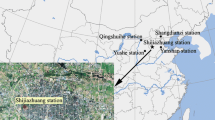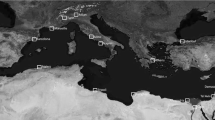Abstract
Temperature differences among days of the week and their long-term trends were evaluated using 29 years of hourly data from the Automated Meteorological Data Acquisition System network of Japan. Stations were categorized with respect to the population density around each site, and an urban temperature anomaly (δT*) was defined as a departure from the spatial average of nearby rural stations. On Saturdays and holidays (Sundays and national holidays), δT* was lower than on weekdays by 0.2–0.25°C at Tokyo, by 0.1–0.2°C at Osaka, and by about 0.02°C at stations where the population density was 300 to 1,000 km–2. Moreover, δT* showed a relative decreasing trend over the long term on Mondays and an increasing trend on Fridays, at a rate of about 0.05–0.1°C decade–1 at Tokyo and about 0.02°C decade–1 at stations where the population density was 100 to 1,000 km–2, but no significant difference in δT* trends was observed between weekdays and weekend days.










Similar content being viewed by others
References
Barmet P, Kuster T, Muhlbauer A, Lohmann U (2009) Weekly cycle in particulate matter versus weekly cycle in precipitation over Switzerland. J Geophys Res 114:D05206. doi:10.1029/2008JD011192
Bäumer D, Vogel B (2007) An unexpected pattern of distinct weekly periodicities in climatological variables in Germany. Geophys Res Lett 34:L03819. doi:10.1029/2006GL028559
Bell TL, Rosenfeld D, Kim K-M, Yoo J-M, Lee M-I, Hahnenberger M (2008) Midweek increase in U.S. summer rain and storm heights suggests air pollution invigorates rainstorms. J Geophys Res 113:D02209. doi:10.1029/2007JD008623
Choi Y, Jung H-S, Nam KY, Kwon WT (2003) Adjusting urban bias in the regional mean surface temperature series of South Korea, 1968–99. Int J Climatol 23:577–591. doi:10.1002/joc.881
de F Forster PM, Solomon S (2003) Observations of a “weekend effect” in diurnal temperature range. Proc Natl Acad Sci 100:11225–11230
DeLisi MP, Cope AM, Franklin JK (2001) Weekly precipitation cycles along the northeast corridor? Weather Forecast 16:343–353
Fujibe F (1987) Weekday-weekend differences of urban climates. Part 1: Temporal variation of air temperature and other meteorological parameters in the central part of Tokyo. J Meteorol Soc Jpn 65:923–929
Fujibe F (1988a) Weekday-weekend differences of urban climates. Part 2: Detection of temperature differences for medium- and small-sized cities. J Meteorol Soc Jpn 66:373–376
Fujibe F (1988b) Weekday–weekend differences of urban climates. Part 3: Temperature and wind fields around Tokyo and Osaka. J Meteorol Soc Jpn 66:377–385
Fujibe F (1995) Temperature rising trends at Japanese cities during the last hundred years and their relationship with population, population increasing rates and daily temperature ranges. Pap Meteorol Geophys 46:35–55. doi:10.2467/mripapers.46.35
Fujibe F (2009) Detection of urban warming in recent temperature trends in Japan. Int J Climatol 29:1811–1822
Gong D-Y, Guo D, Ho C-H (2006) Weekend effect in diurnal temperature range in China: opposite signals between winter and summer. J Geophys Res 111:D18113
Gordon AH (1994) Weekdays warmer than week-ends? Nature 367:325–326
Hansen J, Ruedy R, Sato M, Imhoff M, Lawrence W, Easterling D, Peterson T, Karl T (2001) A closer look at United States and global surface temperature change. J Geophys Res 106:23947–23963. doi:10.1029/2001JD000354
Hendricks Franssen HJ (2008) Comment on “An unexpected pattern of distinct weekly periodicities in climatological variables in Germany” by Dominique Bäumer and Bernhard Vogel. Geophys Res Lett 35:L05802. doi:10.1029/2007GL031279
Hendricks Franssen HJ, Kuster T, Barmet P, Lohmann U (2009) Comment on “Winter ‘weekend effect’ in southern Europe and its connection with periodicities in atmospheric dynamics” by A. Sanchez-Lorenzo et al. Geophys Res Lett 36:L13706. doi:10.1029/2008GL036774
Ichinose T, Shimodozono K, Hanaki K (1999) Impact of anthropogenic heat on urban climate in Tokyo. Atmos Environ 33:3897–3909
Jones PD, Lister DH, Li Q (2008) Urbanization effects in large-scale temperature records, with an emphasis on China. J Geophys Res 113:D16122. doi:10.1029/2008JD009916
Kato H (1996) A statistical method for separating urban effect trends from observed temperature data and its application to Japanese temperature records. J Meteorol Soc Jpn 74:639–653
Kawamura T (1985) Recent changes of atmospheric environment in Tokyo and its surrounding area. Geogr Rev Jpn 58B:83–94
Kim B-G, Choi M-H, Ho C-H (2009) Weekly periodicities of meteorological variables and their possible association with aerosols in Korea. Atmos Environ 43:6058–6065
Kimura F, Takahashi S (1991) The effects of land-use and anthropogenic heating on the surface temperature in the Tokyo Metropolitan area: a numerical experiment. Atmos Environ 25B:155–164
Kusaka H, Kimura F (2004) Thermal effect of urban canyon structure on the nocturnal heat island: numerical experiment using a mesoscale model coupled with an urban canopy model. J Appl Meteorol 43:1899–1910
Lai W-L, Cheng W-L (2010) Air temperature change due to human activities in Taiwan for the past century. Int J Climatol 30: 432–444
Laux P, Kunstmann H (2008) Detection of regional weekly weather cycles across Europe. Environ Res Lett 3:044005. doi:10.1088/1748-9326/3/4/044005
Lawrence EN (1971) Urban climate and day of the week. Atmos Environ 5:935–948
Mitchell JM Jr (1953) On the causes of instrumentally observed temperature trends. J Meteorol 10:244–261
Ohashi Y, Genchi Y, Kondo H, Kikegawa Y, Yoshikado H, Hirano Y (2007) Influence of air-conditioning waste heat on air temperature in Tokyo during summer: numerical experiments using an urban canopy model coupled with a building energy model. J Appl Meteorol Climatol 46:66–81
Parker DE (2006) A demonstration that large-scale warming is not urban. J Climate 19:2882–2895
Peterson TC (2003) Assessment of urban versus rural in situ surface temperatures in the contiguous United States: no difference found. J Climate 16:2941–2959
Peterson TC, Owen TW (2005) Urban heat island assessment: metadata are important. J Climate 18:2637–2646
Ren G, Chu Z, Zhou J, Zhou Y, Zhang A, Guo J, Liu X (2008) Urbanization effects on observed surface air temperature trends in North China. J Climate 21:1333–1348
Sanchez-Lorenzo A, Calbó J, Martin-Vide J, Garcia-Manuel A, García-Soriano G, Beck C (2008) Winter “weekend effect” in southern Europe and its connections with periodicities in atmospheric dynamics. Geophys Res Lett 35:L15711. doi:10.1029/2008GL034160
Schultz DM, Mikkonen S, Laaksonen A, Richman MB (2007) Weekly precipitation cycles? Lack of evidence from United States surface stations. Geophys Res Lett 34:L22815. doi:10.1029/2007GL031889
Simmonds I, Keay K (1997) Weekly cycle of meteorological variations in Melbourne and the role of pollution and anthropogenic heat release. Atmos Environ 31:1589–1603
You Q, Kang S, Flügel W-A, Sanchez-Lorenzo A, Yan Y, Xu Y, Huang J (2009) Does a weekend effect in diurnal temperature range exist in the eastern and central Tibetan Plateau? Environ Res Lett 4:045202. doi:10.1088/1748-9326/4/4/045202
Author information
Authors and Affiliations
Corresponding author
Rights and permissions
About this article
Cite this article
Fujibe, F. Day-of-the-week variations of urban temperature and their long-term trends in Japan. Theor Appl Climatol 102, 393–401 (2010). https://doi.org/10.1007/s00704-010-0266-y
Received:
Accepted:
Published:
Issue Date:
DOI: https://doi.org/10.1007/s00704-010-0266-y




